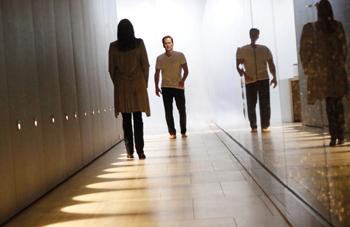Re-Redeemed
A Gifted Man, created by Susannah Grant ’84 (CBS, Friday evenings)
Reviewed by Josh Bell ’02
 Grant’s A Gifted Man stars Patrick Wilson as neurosurgeon Michael Holt.
|
[TV] The first episode of the CBS medical drama A Gifted Man, created by Susannah Grant ’84, plays out like a movie in miniature. It starts by presenting Manhattan neurosurgeon Michael Holt (Patrick Wilson) as a closed-off, arrogant automaton who saves the lives of the rich and powerful but cares little for the masses of humanity. Michael’s whole worldview comes into question when he’s confronted by the ghost of his ex-wife Anna (Jennifer Ehle), a self-sacrificing do-gooder who, when she was alive, had devoted all of her time to running a free clinic in a rundown neighborhood. Anna insists that Michael go down to her clinic and help the staffers who are at a loss following her sudden death; he does so reluctantly, but soon finds himself caught up in caring for patients who have no means to pay for their care.
In treating a young boy from a poor family, Michael learns the value of selflessness. In his own well-off patients (a rich older man who gets himself killed by drinking and carousing instead of resting after emergency surgery; a young tennis player who values her pursuit of a world record over her own health), Michael sees the vanity and ego that have taken over his own life. When a self-proclaimed shaman tries to rid Michael of Anna’s ghost, Michael realizes he needs her to stick around to help him become a better person.
There’s plenty of manipulative sentiment inherent in the show’s premise, but Grant—who wrote the episode—manages to avoid most of it, taking pains to show that Michael is a fundamentally good person who just has his priorities askew: he genuinely cares about his patients and his family (he bails his nephew out of jail and covers his sister’s rent). Director Jonathan Demme, who’s had a distinguished film career, brings a graceful style to the episode, integrating the ethereal moments of Anna’s visitations with the more grounded details of Michael’s interactions with his patients. Michael’s journey from narcissism to empathy is predictable, but it feels earned, and by the end of the episode, he’s grown as a person while retaining his individuality.
But a TV show isn’t a movie, and so Michael must return week after week to treat more patients and continue on his journey of self-discovery, with Anna as his guide. In subsequent episodes written by other members of the show’s writing staff, Grant’s delicate balance of sentiment and grit is thrown off in favor of a fairly rote medical procedural with sappy mystical overtones. Anna shows up mostly to badger Michael into helping the less fortunate, and the medical cases overshadow the character development. Wilson still brings a welcome restraint to his performance as Michael, who is always trying to do the right thing even when he is neglecting the needs of the free clinic. And Rachelle Lefevre, who shows up in the third episode as the clinic’s new director, does a good job of providing a counterpoint to Michael’s pragmatism, playing a young doctor. As Michael’s story continues indefinitely, Grant’s tight narrative of redemption loses some definition, but its resonant themes and rich character dynamics still get some chance to shine through.
Josh Bell, the film editor for Las Vegas Weekly, reviewed the new Thor omnibus, by Walter Simonson ’68, in the Summer 2011 Amherst magazine.
Photo by Craig Blankenhorn